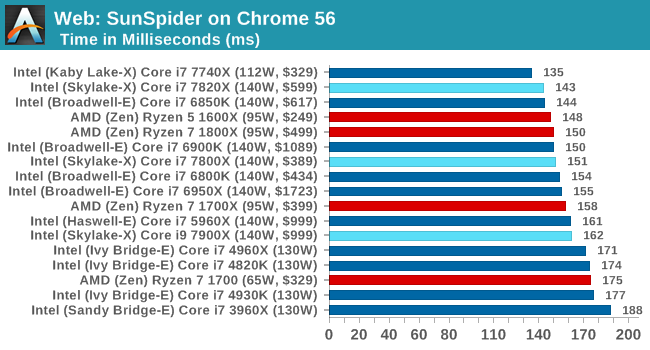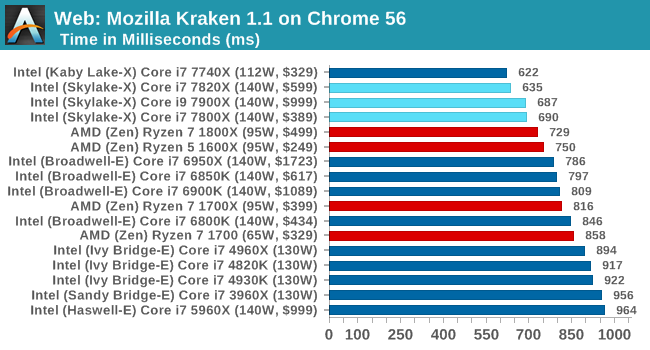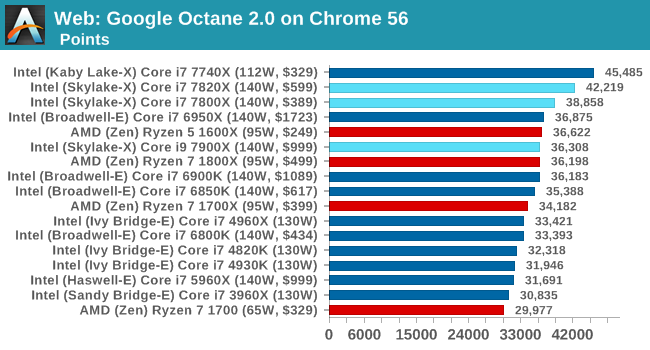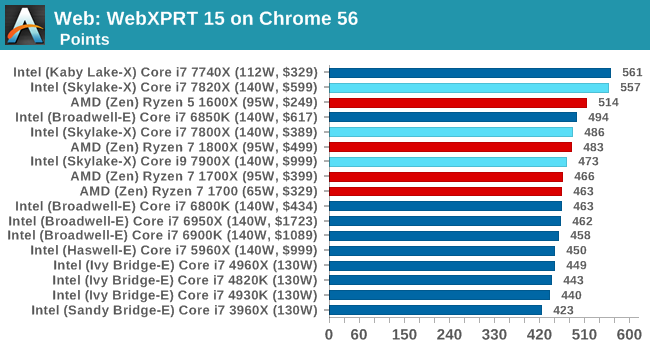The Intel Skylake-X Review: Core i9 7900X, i7 7820X and i7 7800X Tested
by Ian Cutress on June 19, 2017 9:01 AM ESTBenchmarking Performance: CPU Web Tests
One of the issues when running web-based tests is the nature of modern browsers to automatically install updates. This means any sustained period of benchmarking will invariably fall foul of the 'it's updated beyond the state of comparison' rule, especially when browsers will update if you give them half a second to think about it. Despite this, we were able to find a series of commands to create an un-updatable version of Chrome 56 for our 2017 test suite. While this means we might not be on the bleeding edge of the latest browser, it makes the scores between CPUs comparable.
SunSpider 1.0.2
The oldest web-based benchmark in this portion of our test is SunSpider. This is a very basic javascript algorithm tool, and ends up being more a measure of IPC and latency than anything else, with most high-performance CPUs scoring around about the same. The basic test is looped 10 times and the average taken. We run the basic test 4 times.

Sunspider goes after peak frequency most of the time, althoguh there is some variation as it moves into basically becoming a legacy test.
Mozilla Kraken 1.1
Kraken is another Javascript based benchmark, using the same test harness as SunSpider, but focusing on more stringent real-world use cases and libraries, such as audio processing and image filters. Again, the basic test is looped ten times, and we run the basic test four times.

Kraken is more of an intense attack on JS, and still regularly sorts by IPC and frequency.
Google Octane 2.0
Along with Mozilla, as Google is a major browser developer, having peak JS performance is typically a critical asset when comparing against the other OS developers. In the same way that SunSpider is a very early JS benchmark, and Kraken is a bit newer, Octane aims to be more relevant to real workloads, especially in power constrained devices such as smartphones and tablets.

Octane seems to be an optimization target, and with the new Skylake-X it shows.
WebXPRT 2015
While the previous three benchmarks do calculations in the background and represent a score, WebXPRT is designed to be a better interpretation of visual workloads that a professional user might have, such as browser based applications, graphing, image editing, sort/analysis, scientific analysis and financial tools.











264 Comments
View All Comments
geekman1024 - Monday, June 19, 2017 - link
Zen is winning in one department: Price.Lolimaster - Tuesday, June 20, 2017 - link
Ryzen has a sick efficiency at lower clocks, that Ryzen 7 1700 65w can de undervolted further more and make it a 50w 3Ghz monster.sir_tech - Monday, June 19, 2017 - link
Why there are no power consumption charts in the review? Also, you should have gone ahead and post the gaming performance charts also just like Ryzen reviews.While the MSRP is high the actual retail price for Ryzen processors retail prices are much lower now.
Ryzen 7 1800x - $439 (MSRP - $499)
Ryzen 7 1700x - $349 (MSRP - $399)
Ryzen 7 1700 - $299 (MSRP - $329)
Ryzen 5 1600x - $229 (MSRP - $249)
Ryan Smith - Monday, June 19, 2017 - link
"Why there are no power consumption charts in the review?"Please refresh the conclusion.=)
"Also, you should have gone ahead and post the gaming performance charts also just like Ryzen reviews."
The BIOS updates have come so late that we don't even have a complete dataset for the new BIOSes. Ian had just enough time to make sure they were still screwy, and then was on a plane. We're going to need to sit down and completely redo all the Skylake-X chips once the platform stabilizes to the point where our results won't be immediately invalidated.
cheshirster - Monday, June 19, 2017 - link
Your DDR4-2400 tests of 1800X and 1600X are already invalidated.And RoTR
There was no problem with publishing bad gaming results for AMD.
What's the problem with 2066?
Ryan Smith - Monday, June 19, 2017 - link
If we had a complete, up-to-date dataset to publish, and time to write it up, we would have. If only to showcase why eager gamers should wait for the platform to mature a bit.cheshirster - Monday, June 19, 2017 - link
Sorry, with this text:"Our GTX1080 seems to be hit the hardest out of our four GPUs, as well as Civilization 6, the second Rise of the Tomb Raider test, and Rocket League on all GPUs. As a result, we only posted a minor selection of results, most of which show good parity at 4K"
+ ryzen bad fullhd results in RoTR and Rocket League fully published.
You are going straigh to the Hall of Fame of typical brand loyalists.
jospoortvliet - Thursday, June 22, 2017 - link
Well the state of Ryzen wasn't as bad as this and it isn't like it was not pointed out in this review.Also I am sure other benchmarks were also affected making Intel look worse in benchmark databases thanks to their rush job...
bongey - Wednesday, August 2, 2017 - link
Yep you bashed Ryzen in gaming in your review, quit lying."Gaming Performance, particularly towards 240 Hz gaming, is being questioned,"
Gasaraki88 - Monday, June 19, 2017 - link
Everything is on default, no overclocking.